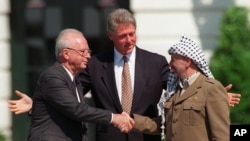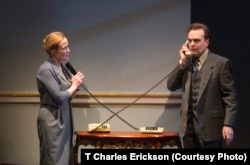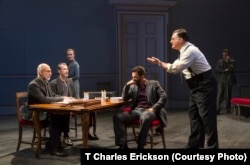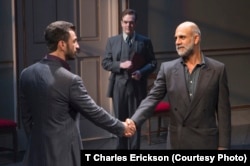It was a moment no one imagined would ever happen: a handshake between Israeli Prime Minister Yitzhak Rabin and Palestine Liberation Organization Chairman Yasser Arafat on the White House lawn in September 1993, sealing the historic agreement that set the long-time enemies on a path to peace.
Despite a major effort by Washington to bring the two sides together, the agreement was forged during months of secret back-channel talks in Norway. A new off-Broadway play, OSLO, looks at this little-known part of the peace process.
The play, by J.T. Rogers, is based on his interviews with the two people responsible for those talks, sociologist and academic Terje Rød-Larsen and his wife, Mona Juul, a foreign service officer. At the time, she had been posted to Cairo, where they got to know people on both sides of the conflict. When official peace talks in Washington, D.C., stalled, and riots in Israel and the West Bank increased, the couple decided to step in.
On stage, Rød-Larsen notes that the conditions on the ground, tragic as they are, are perfect for progress. "The desperation they’re feeling on both sides," he tells Juul, "this is our ally."
Rød-Larsen, now president of the International Peace Institute, recalls that they arranged for both parties to meet secretly in Norway, without the initial approval of their government.
“We did it in a way, exactly the opposite way of what it was done in Washington. We did not put proposals on the table. We said we would facilitate, bring the parties together, be go-between, assist them in any way, saying 'It’s your problem, you have to resolve it yourself. We don’t want to push anything on you.' And number two, we set up the delegations, should never exceed three persons on each side, because trust is dependent on personal relationships and to build personal relationships. And then we also insisted that they should live in the same house. They should have all meals together; breakfast, lunch and dinner. When there were breaks they could go for walks together, etc. They had to live together.”
The sociologist was testing a theory. But playwright J.T. Rogers says the story behind OSLO is anything but a dry academic treatise. “It was very clear that it was a thriller, because it was – the ticking clock is the dramatist’s friend.” And the actors who play the Norwegian couple, Jennifer Ehle and Jefferson Mays, say that’s how it feels every night.
“We are continually surprised by this play; the doing of it," Mays said, "It feels like an ambush. We never know exactly what’s going on or…" Ehle jumps in to add, "or what’s coming next." Both actors say they continually refer to the script. Mays says, "There’s something about doing this play that feels like a wild improvisation.”
Rogers says he wanted to explore the intersection of the personal with the political. “The hope was to make a political play in the Greek sense of that word; a play about the public and the larger ideas about who we are, as human beings and as nations. And how do we go forward and how do we live, with our enemies and with ourselves?”
Rød-Larsen says OSLO suggests an answer, one as relevant today as it was two decades ago. “If you bring the right toolbox and handle the tools the right way, there are also possibilities today, because there is one similarity with the situation at the time of Oslo and the time of today; that is, that everything looks impossible. And sometimes the impossible is easier to do than the possible. If you have resilience and are persistent, you can do things that nobody believes is possible.”
And critics and audiences have responded to that message; the off-Broadway run at Lincoln Center is sold out, and it was just announced that OSLO will move to Broadway next spring.







